The heartbreaking beauty of "Brief Encounter"
 Sunday, June 13, 2021 at 12:07PM
Sunday, June 13, 2021 at 12:07PM 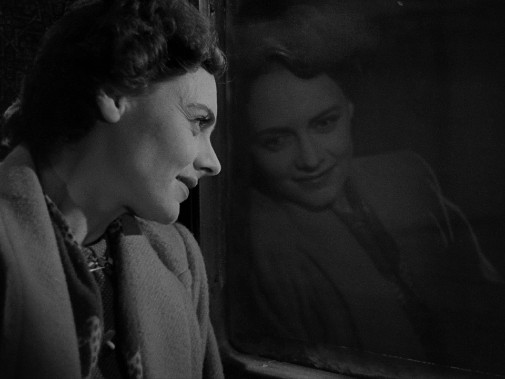
Ever since I listened to Robert Altman's commentary track on the Gosford Park DVD, I've bristled at the idea that someone needs to be a certain age to enjoy a film. In that bonus feature, Altman mentions that Gosford Park has nothing to offer to fourteen-year-old boys, and they shouldn't get to watch it. As a fourteen-year-old boy for whom Gosford Park was a favorite, I felt personally attacked. A bit more than a decade later, I've grown less annoyed at such blanket statements about age and movie appreciation. As it turns out, there are films that can gain something when the audience seeing them is more mature. You may be asking yourself, what does this have to do with Brief Encounter or our 1946 celebration? Apologies for my long-windedness.
I'm trying to introduce a personal realization I had. While I might have loved Brief Encounter when I was a teen, I knew not of its power. Now, I think it's one of the best and most devastating films ever made…
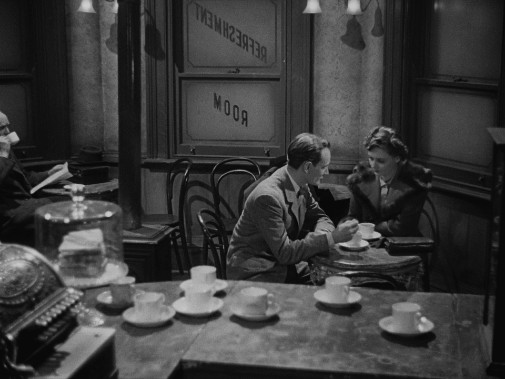
Adapted from a one-act play by Noël Coward, 1945's Brief Encounter marks David Lean's fourth foray into feature film directing. The story is relatively simple, even mundane, though one shouldn't judge it for this banality. If there was ever a film that argues for the human wonder hiding beneath the façade of the boring quotidian, it's Brief Encounter. The picture unfolds over some nondescript days in postwar London, when Laura, a bored housewife, happens to meet a strappingly handsome doctor named Alec. A particle of grit stuck in her eye is the material of which their most unglamorous meet-cute is made of, a passing encounter at a train station, apparently meaningless.
However, one meeting blossoms into many conversations, gleeful afternoons shared with much delight, friendship, perchance, much more. It's fascinating how perfectly platonic it all is, how the meeting of two lonesome souls can cause sparks even when neither party is keen on starting a fire. We get to know of this affair through Laura's confession, a stream-of-consciousness narration that manifests when she's at home, in the company of her harmlessly tedious husband. Earlier in the evening, a conversation with Alec had been cut short by the interruption of a gossipy friend, and Laura didn't get to say goodbye. The quasi-adulteress is still reeling from it. If not for the sorrow etched in Celia Johnson's features, we might have thought it a scene of no great importance. However, the actress makes it clear that Laura is dying inside.
In flashback, we discover the reasons for her sorry state, as she tells of forbidden love, how it hardly ever transgressed past the platonic and how it's now reached its end. Her description of day-to-day life verges on the ridiculous, her mind, her eyes, constantly sidetracked by inane details. Along with his protagonist, Lean indulges in the casual observation of commonplace middle-class routine, unearthing a peculiar sense of emotional authenticity from this accumulation of fatuities. It's silly to say so, but the screen positively vibrates with life whenever Johnson's Laura forgets about the cage of 1940s English society. Her day can be made more exciting by something as familiar as a cheerful tune ringing in the street or the giddy thrill of splurging on a gift for a loved one, savoring their future joy.
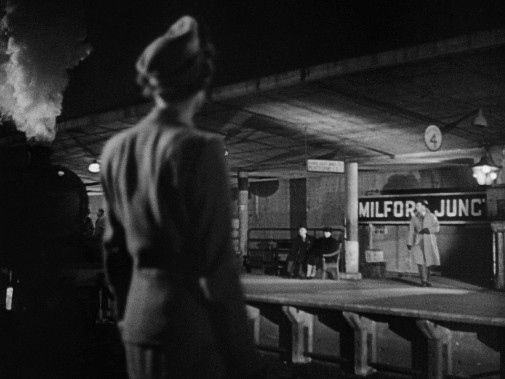
Apart from these variations, Laura's life is that of a zombie, numbly experienced with a visible lack of enthusiasm. She's not unlike most of us, allowing a carapace of outward indifference to cover the tender interior of her heart, her soul. In this portrait of an unexciting middle-aged woman, we can see that strange dichotomy of feeling most people come to suffer – we hide so much, and yet what we yearn most is to be seen by another. Furthermore, seeing can be just as thrilling. One may indeed pinpoint the moment when Laura becomes enthralled by Alec in the way Celia Johnson opens up with a jolt of recognition when noticing a boyish excitement as Alec speaks about his medical ambitions. It's not just that he sees her. She sees him too. Out of their shared look, love comes spewing forth.
Do they truly know one another, though? What's perchance most tragic about Laura's fate is that not even Alec saw her. Not entirely, not in the end. That's more than most, but it still feels like it's not enough. The only ones who see her are us, the audience to which she confesses her innermost thoughts. It's both a burdensome responsibility and an incredible privilege to be the receptors of her truth. In some ways, it's the maximum miracle of cinema - to grant us this gift of peering into someone's bared soul, be it a character's heart or the artists' spirit. I'd go so far as saying that, despite its visual smallness, Laura's emotional storm is as vast and awe-inspiring as any of the widescreen vistas in Lean's later epics. In its particular fashion, Brief Encounter's as majestic, if not more so.
There's much to say about this film, and yet I feel like no words will ever be enough to express its greatness. From a purely mechanical standpoint, it's remarkable how everything in it works so perfectly, from the negligible details of its editing rhythms to the Oscar-nominated performance of Celia Johnson. Re-watching the film this time around, I was especially amazed by how well she illustrates the cruel fear accompanying a triumphant lie. Realizing one can get away with it, that one's penchant for lying transcends the ability to self-delude, is a startling thing, and the actress embodies it all to perfection. The picture's overflowing with such miraculous bits of performance and gentle humanism, these beautiful moments lost between liminal spaces, lost memories and lost loves. Those impossible dreams that glisten for an ephemerous minute in the ever-shifting landscape of a train window.
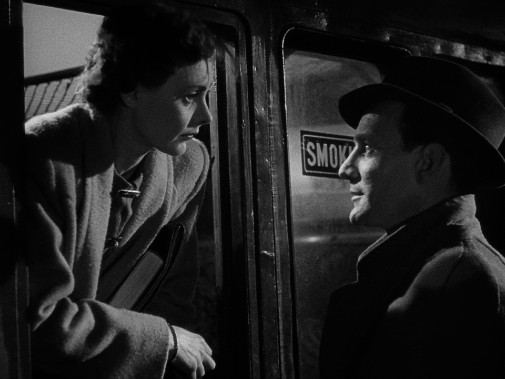
At one point, a character states, "You can never be dull." What Brief Encounter makes clear is that no one really can be, and isn't that wonderful and horrible at the same time? Entire universes exist inside all of us, every individual awesomely specific and unfathomably mysterious. Look at any given train station, and you'll find galaxies of memory inside each waiting passenger, epic loves falling apart silently in a corner, bottomless pits of despair forming invisibly inside a stranger's restless psyche. The mystery of each person is both glorious and heartbreaking, for it is forever unreachable, a train one can never embark. Maybe it's because I miss the train stations of the pre-pandemic world that the setting of Brief Encounter was so painfully evocative to me as I watched it today. Maybe, it's my age.
I'm still in my twenties but have gained much more life experience than I had when first seeing Brief Encounter as a teen. Over the years, I've started accumulating a small mountain of regrets and what-ifs, unanswered questions, and hauntings that go with me everywhere, chains dragging along. I often think of what I might have lost or gained if I'd made different choices. If I had taken another train or got off before my stop. Seeing Laura's despair, I can see my own reflected in silvery celluloid. I also see the memory of love and being loved, losing that along the way, and the ghostly pain it leaves behind. In that regard, the power of Brief Encounter has mutated with time. It's not the film that has changed. It's me. Such is the heartbreaking beauty of this perfect flick that I hope to revisit many more times over decades. In some years, I might be even more passionate about it. Altman had a point... sort of.
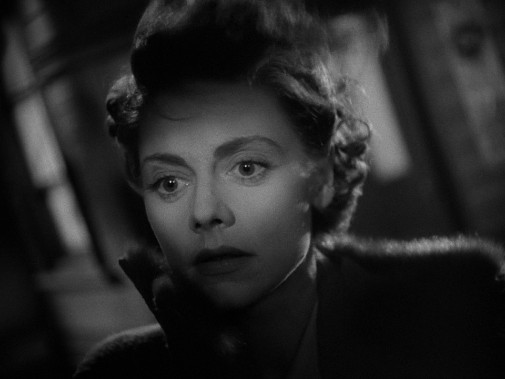
Brief Encounter's streaming on HBO Max, the Criterion Channel, Shout Factory, and Flix Fling.



Reader Comments (10)
The beauty of revisiting movies over the course of our lives and changing perspectives is one of the great and under-appreciated joys of the film experience.
Very well written analysis of what is one of the masterpieces of cinema- a simple film which reveals so much
You are an incredible gifted writer. I always come away from your pieces with renewed insight.
Age and life experiences do influence how we emotionally connect to art, but some works can charge our souls, and only later in years come to grasp why. At age 9, I felt exposed by the isolated angst of Anne Bancroft's Jo in "The Pumpkin Eater". The first time I viewed "Death in Venice" as a teen, I knew of the unrequited longing of Aschenbach. The layers of a character as deeply etched as Celia Johnson's were ,transcends the limits of an age.
I do love this film and man, it's such a devastating film to watch.
I can sort of agree with Robert Altman's assessment on what 14 year olds liked as I probably wouldn't have liked a film like Gosford Park nor Brief Encounter at that time. I was too immature to understand films like this though I was more into softcore porn films at that time (and a lot of them still hold up).
I was a 14 year old boy when I fell in love with Gone With The Wind...
This is a personal favourite of mine that improves each time I see it (and as I get older). I love that the leads are not beautiful movie stars. It makes the film more intimate and the characters more relatable. Not that it isn't relatable on its own. It is such a human story presented on that level. It's easy to understand how the relationship develops and the pain of its ending.
Much credit goes to Trevor Howard and especially Celia Johnson. Her performance is one of my all-time favourites. As much as I love Olivia de Havilland, the 1946 Oscar should have gone to Johnson.
But credit also goes to David Lean. I know his BIG epics are what he is most famous for, but my favourite films of his pre-date Bridge on the River Kwai. He knew how to capture emotion on camera in such subtle but profound ways and was able to expertly maintain pace and tension in the stories he told. He was a thinking person's director.
Brief Encounter is a timeless classic like the writer of this piece. May our encounters with his work be anything but brief.
I love your writing. And I love this movie. It's so touching and heartbreaking all at the same time. Celia Johnson ... just perfection.
I feel so much pity and sympathy for Laura
I absolutely adore Brief Encounter - and Gosford Park. And did so when I was a kid, and so I totally agree. It wasn't until I was much older that I realised that the husband basically knew what Celia Johnson had been up to all along. And similarly upon my first few watches I thought Alan Bates had committed the crime in GP.